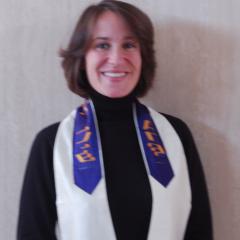
Pursuing Inclusion
by Cantor Faryn Rudnick
Tzedek, tzedek tirdof. Justice, justice, you shall pursue. This famous verse from Deuteronomy 16 is at the center of much of Jewish ideology. But how does one pursue justice? What does it take to pursue justice? And on what level can one individual pursue justice? More often than not, the answer is simply education. How does one know to not be afraid of something foreign? Education. How does one make a difference in his or her community? Education. How does one pursue justice in a world that presents challenges every day? Education.
Recently, I was walking in the airport, and a man in a wheelchair was at a kiosk promoting credit cards that earn frequent flier miles. I smiled at the man but kept walking because I did not want waste his time or my own. But as this man was simply trying to do his job, I noticed the number of people who did not even look in his direction. Could this have been a response to what he was selling? Perhaps, though it's more likely that it was a response to the man's disability. In the year 2014, in a culture that is advanced on so many levels, people are still afraid of those with disabilities.
I have the good fortune to represent the American Conference of Cantors on the Jewish Disabilities Network, an organization consisting of clergy and lay leaders in the field of Judaism and inclusion. This group works hard to pursue justice for people with disabilities through education on a national level. The JDN brings the issues to our politicians, advocating for those with disabilities to receive the fair treatment they deserve in education, employment, and housing. The individuals who make up the JDN also work on a local level within their communities. At Temple Beth-El, we recently formed an inclusion team that will help to plan designated programs and services for people with disabilities as well as help to make the physical structure and internal environment of the synagogue more inclusive and accessible. The inclusion team will help to educate our community about providing fair and inclusive services for those with disabilities.
Other Jewish organizations are doing their part as well. Jewish Child and Family Services provides education (lectures, workshops, etc.) for aging parents of adults with disabilities, a demographic that is often not well served, as well as group living, social opportunities, and future planning training for adults with disabilities. Congregation Rodeph Sholom on New York City's Upper West Side has been paving the way with inclusive worship with their Shireinu program for Jews with disabilities for several years.
In Midrash Devarim, the rabbis explain that God loves justice even more than sacrifice. Sacrifices serve the Temple, and serve the individual who has sinned, but justice serves the entire community and, therefore, serves God. Sacrifices can only be offered at the human level, but even God pursues justice, rendering the pursuit of justice a holy act. As the secular New Year is upon us, I encourage each of us to strive for holiness through the pursuit of justice by welcoming those with disabilities into the community, by not looking away when you see someone with a disability, by not assuming that the parent of the screaming child is a bad parent, but rather that the child may have some disability. I encourage each of us to seek justice by letting our elected officials know that we won't stand idly by while they cut funding or vote down bills that will help those with disabilities. And I encourage each of us to not forget that justice can happen when we stand up, fight, and provide education for what we know to be right.

